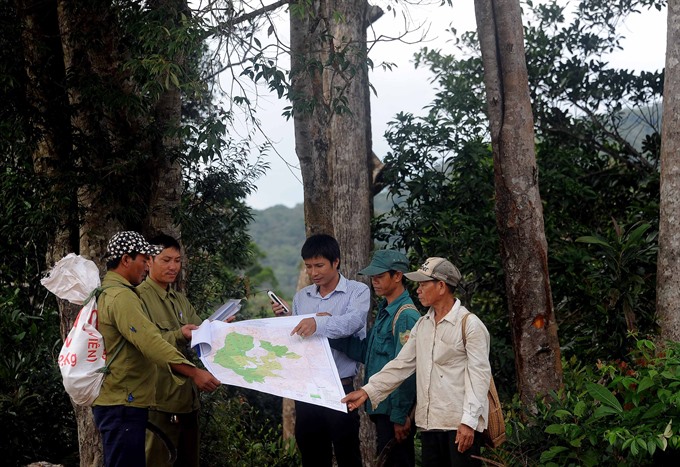 Society
Society

A Government decision with detailed mechanisms is needed for people to better practise their rights on monitoring land use and management, experts have recommended.
 |
| An officer (centre) from the Protection Forest Management Board in Vân Canh District, the central province of Bình Định, talks to local residents about forest areas that they are allocated to protect. — VNA/VNS Photo Quang Quyết |
HÀ NỘI — A Government decision with detailed mechanisms is needed for people to better practise their rights on monitoring land use and management, experts have recommended.
Former deputy minister of Natural Resources and Environment, Đặng Hùng Võ, said that in Việt Nam, citizens have the right to supervise and report wrongdoings and violations in land management and use by themselves or through representative organisations including the National Assembly, People’s Councils at all levels – commune, district and city/province, as well as the Việt Nam Fatherland Front at all levels.
Speaking at a conference on the issue last week, Võ said that Việt Nam’s amended Land Law dated 2013 and taking effect in July, 2014, confirmed citizens’ rights on supervision over land use and management.
“However, there is no legal document that firmly establishes the rules on citizen supervision. For example, to whom do citizens report and how do they report violations,” Võ said.
Until now, citizens usually sent complains relating to land use and management to press agencies that would help raise the issues but they would sometimes be ignored, Võ said.
“It’s time for the Government to develop a system facilitating citizens’ supervision over land use and management,” Võ said.
Trương Quốc Cần, director of the Consultative Institute for Socio-Economic Development of Rural and Mountainous Areas (CISDOMA) under the Agriculture Ministry said that people were very concerned about land use and management policies.
Cần said that because of improper legal understanding and information about Government land policies, the way they usually chose to express their concern was to complain about local authorities or authorised agencies.
Besides improvements in people’s legal understanding, State employees and officials responsible for land issues should undergo training to better address reported problems.
Cần added that people should get used to supervising and reporting their concerns so that problems can be quickly addressed, avoiding potentially serious disputes or conflicts.
From July, 2016 until March, 2018, CISDOMA helped conduct a project titled ‘Citizen Monitoring of Land Governance in Việt Nam’ in three provinces – Hòa Bình, Hà Tĩnh and Cần Thơ. The project is funded by Mekong Region Land Governance, with Oxfam as the co-ordinator of the project’s implementation, with the participation of member organisations in the LANDA and FORLAND networks.
Out of around 180 people interviewed as part of the project, more than half said that they could not receive information related to land issues, such as policies on rent, prices, compensation or resettlement after land eviction.
Just 15 per cent of people interviewed in Hòa Bình and 25 per cent of people in Hà Tĩnh said that they knew about the Land Law.
However, they did not know how and to whom they should send petitions, Cần said.
In communes, fatherland fronts did not have any plans on land-related supervision.
Nguyễn Văn Trị, vice head of the Department for Land Use and Management Control under the Environment Ministry said that since the Land Law 2013 took effect in July, 2014, the department received over 3,000 reports via its hotline on violations relating to land use and management.
Only 961 reports clearly pointed out violations with detailed locations that facilitated authority agencies to verify and tackle the problems.
Trị said that Land Management General Department planned to develop a system which would observe and assess the impacts of land policies. — VNS





 Brandinfo
Brandinfo